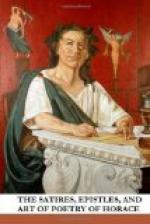“Great fishes on great dishes! how I gloat
Upon the sight!” exclaims some harpy-throat.
Blow strongly, blow, good Auster, and ferment
The glutton’s dainties, and increase their scent!
And yet, without such aid, they find the flesh
Of boar and turbot nauseous, e’en though fresh,
When, gorged to sick repletion, they request
Onions or radishes to give them zest.
Nay, e’en at royal banquets poor men’s
fare
Yet lingers: eggs and olives still are there.
When, years ago, Gallonius entertained
His friends with sturgeon, an ill name he gained.
Were turbots then less common in the seas?
No: but good living waxes by degrees.
Safe was the turbot, safe the stork’s young
brood,
Until a praetor taught us they were good.
So now, should some potential voice proclaim
That roasted cormorants are delicious game,
The youth of Rome (there’s nothing too absurd
For their weak heads) will take him at his word.
But here Ofellus draws a line, between
A life that’s frugal and a life that’s
mean:
For ’tis in vain that luxury you shun,
If straight on avarice your bark you run.
Avidienus—you may know him—who
Was always call’d the Dog, and rightly too,
On olives five-year-old is wont to dine,
And, till ’tis sour, will never broach his wine:
Oft as, attired for feasting, blithe and gay,
He keeps some birthday, wedding, holiday,
From his big horn he sprinkles drop by drop
Oil on the cabbages himself:—you’d
stop
Your nose to smell it:—vinegar, I own,
He gives you without stint, and that alone.
Well, betwixt these, what should a wise man do?
Which should he copy, think you, of the two?
’Tis Scylla and Charybdis, rock and gulf:
On this side howls the dog, on that the wolf.
A man that’s neat in table, as in dress,
Errs not by meanness, yet avoids excess;
Nor, like Albucius, when he plays the host,
Storms at his slaves, while giving each his post;
Nor, like poor Naevius, carelessly offends
By serving greasy water to his friends.
Now listen for a space, while I declare
The good results that spring from frugal fare.
Imprimis, health: for ’tis not hard
to see
How various meats are like to disagree,
If you remember with how light a weight
Your last plain meal upon your stomach sate:
Now, when you’ve taken toll of every dish,
Have mingled roast with boiled and fowl with fish,
The mass of dainties, turbulent and crude,
Engenders bile, and stirs intestine feud.
Observe your guests, how ghastly pale their looks
When they’ve discussed some mystery of your
cook’s:
Ay, and the body, clogged with the excess
Of yesterday, drags down the mind no less,
And fastens to the ground in living death
That fiery particle of heaven’s own breath.
Another takes brief supper, seeks repair
From kindly sleep, then rises light as air:
Not that sometimes he will not cross the line,
And, just for once, luxuriously dine,
When feasts come round with the revolving year,
Or his shrunk frame suggests more generous cheer:
Then too, when age draws on and life is slack,
He has reserves on which he can fall back:
But what have you in store when strength shall fail,
You, who forestall your goods when young and hale?




